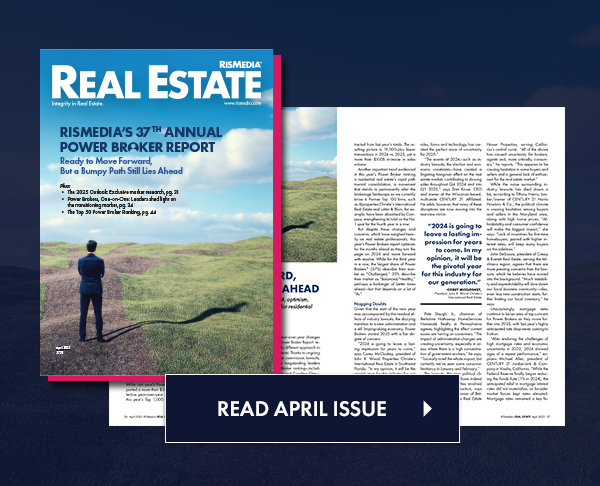Following a drop to its lowest level in three decades by the end of last year, existing-home sales reversed course last month, rising 3.1% from December to a rate of 4.00 million in January, down 1.7% year-over-year, or 4.07 million sales, according to the latest report from the National Association of REALTORS® (NAR).
NAR’s Existing Home Sales report for January found that total housing inventory was 1.01 million units, up 2.0% from December, and up 3.1% from one year ago (980,000). Unsold inventory sits at a 3.0-month supply at the current sales pace, down from 3.1 months in December, but up from 2.9 months in January 2023.
The median existing-home price for all housing types was $379,100, an increase of 5.1% from January 2023 ($360,800).
Properties typically remained on the market for 36 days in January, up from 29 days in December and 33 days in January 2023.
First-time buyers were responsible for 28% of sales, down from 29% in December and 31% in January 2023. NAR’s 2023 Profile of Home Buyers and Sellers found that the annual share of first-time buyers was 32%.
Individual investors or second-home buyers (who make up many cash sales) purchased 17% of homes in January, up from 16% in December and January 2023.
Distressed sales—foreclosures and short sales—represented 2% of sales in January, virtually unchanged from last month and the previous year.
Single-family home sales moved higher to a seasonally adjusted annual rate of 3.6 million in January, up 3.4% from 3.48 million in December but down 1.4% from the prior year. The median price was $383,500, up 5.0% from January 2032.
At a seasonally adjusted annual rate of 400,000 units in January, existing condominium and co-op sales were unchanged from last month and down 4.8% from one year ago (420,000 units). The median existing condo price was $339,400 in January, up 5.7% from the previous year ($321,100).
Regionally, all four regions posted price increases.
At 480,000 units, existing-home sales in the Northeast were unchanged from December but down 5.9% from January 2023. The median price in the Northeast was $434,300, up 10.1% from the prior year.
In the Midwest, existing-home sales increased 2.2% from one month ago to an annual rate of 950,000 in January, down 3.1% from last year. The median price in the Midwest was $271,700, up 7.6% from January 2023.
Existing-home sales in the South rose 4.0% from December to an annual rate of 1.84 million in January, a decline of 1.6% from the previous year. The median price in the South was $345,100, up 4.1% from one year ago.
In the West, existing-home sales elevated 4.3% from a month ago to an annual rate of 730,000 in January and grew 2.8% from one year earlier. The median price in the West was $572,100, up 6.3% from January 2023.
The takeaways:
NAR Chief Economist Dr. Lawrence Yun commented: “While home sales remain sizably lower than a couple of years ago, January’s monthly gain is the start of more supply and demand. Listings were modestly higher, and home buyers are taking advantage of lower mortgage rates compared to late last year.
“The median home price reached an all-time high for the month of January,” Yun added. “Multiple offers are common on mid-priced homes, and many homes were still sold within a month. The elevated share of cash deals—32%—indicated a market full of multiple offers and propelled by record-high housing wealth.”
Bright MLS Chief Economist Dr. Lisa Sturtevant commented: “Falling rates in December brought more buyers into the market, which drove the increase in closed sales in January. Overall, in 2023, the number of existing home sales was at its lowest level since 1995, so it is widely expected that overall market activity will increase in 2024.
“Sales of existing homes still tracked 1.7% below last year. There is still strong demand, as the large millennial population remains in the prime first-time home-buying range. However, many are being shut out of the market due to rising home prices and elevated mortgage rates. The median sold price was up 5.1% in January. There was a notable uptick in homeownership rates during the pandemic. Non-white individuals and families benefited most from the historically low interest rates in late 2020 and early 2021. However, rates are now much higher and home prices have escalated, which has led to a retraction in the pace of homebuyers.
“Delaying homeownership—or having to put it off altogether—means that many individuals and families are missing out on a critical way to build wealth. The wealth gap in the U.S., which is already very high, will widen as existing homeowners and higher-income households are able to enter into homeownership while lower-income, and prospective first-time and first-generation households are increasingly going to be left out.”
Dr. Selma Hepp, chief economist at CoreLogic, commented: “Existing home sales will continue to be constrained in the foreseeable future as the supply of homes remains tight and sellers continue to wait for lower mortgage rates. All eyes are on the Fed now to cut rates this summer in order to provide relief to the buyers as well as stubborn sellers. Should they do so, existing home sales should expect a better outlook for the remainder of the year.”
Realtor.com® Chief Economist Danielle Hale commented: “Existing home sales ticked up in January. Sales rose 3.1% from December to a pace of 4.0 million–their highest since August 2023. Sales still lagged the year ago pace by 1.7%. Mortgage rates tumbled from late October through mid-January, propelling sales as shoppers capitalized on lower costs.
“Pending home sales, which are based on contract signings, an earlier stage in the sales process that tend to lead existing home sales by a month or two, saw a big pop in December and grew over the prior year for the first time since May 2021. Despite the pickup, both pending and existing home sales remain historically low, coming off the heels of 2023, which saw the lowest total home sales tally in nearly 30 years as high costs stemming from high prices and mortgage rates continue to remain a challenge for many shoppers.
“The median existing home sales price rose further, by 5.1%. With inflation surprising on the high side and shelter inflation continuing to be the major driver, housing costs are front and center. Although home sales prices grew, the latest Realtor.com January Rental Trends Report showed that rents softened again, nationwide. Despite the pull-back, rents remain up 18.3% above 2019, highlighting the long-run impact of inflation on costs–what goes up in this case doesn’t tend to come back down (by much). While starts for multi-family homes fell in January, completion gains mean that more multi-family homes are entering the market for rent, helping to better balance supply with demand and stem rental cost gains, as anticipated in Realtor.com’s 2024 Housing Forecast.
“Recent surveys indicate that consumers expected additional mortgage rate drops in 2024, but a hot jobs report followed closely by an elevated inflation reading in the consumer price index has ended the dip in mortgage rates for now, which could mean slower seasonally adjusted sales as the heart of homebuying season approaches. First-time buyers have struggled in this environment, with the share of first-time buyers slipping to 28% in January, down from 29% in December and 31% in January 2023. Younger buyers, however, say they are less dissuaded by the potential of higher mortgage rates. In a recent Realtor.com survey of home shoppers, nearly half (47%) of Millennial home shoppers said they would still buy a home even if mortgage rates went above 8%, signaling their determination. Older generations were far less likely to be willing to buy with a rate above 8%, likely reflecting their anchoring to an existing lower-rate mortgage.”












